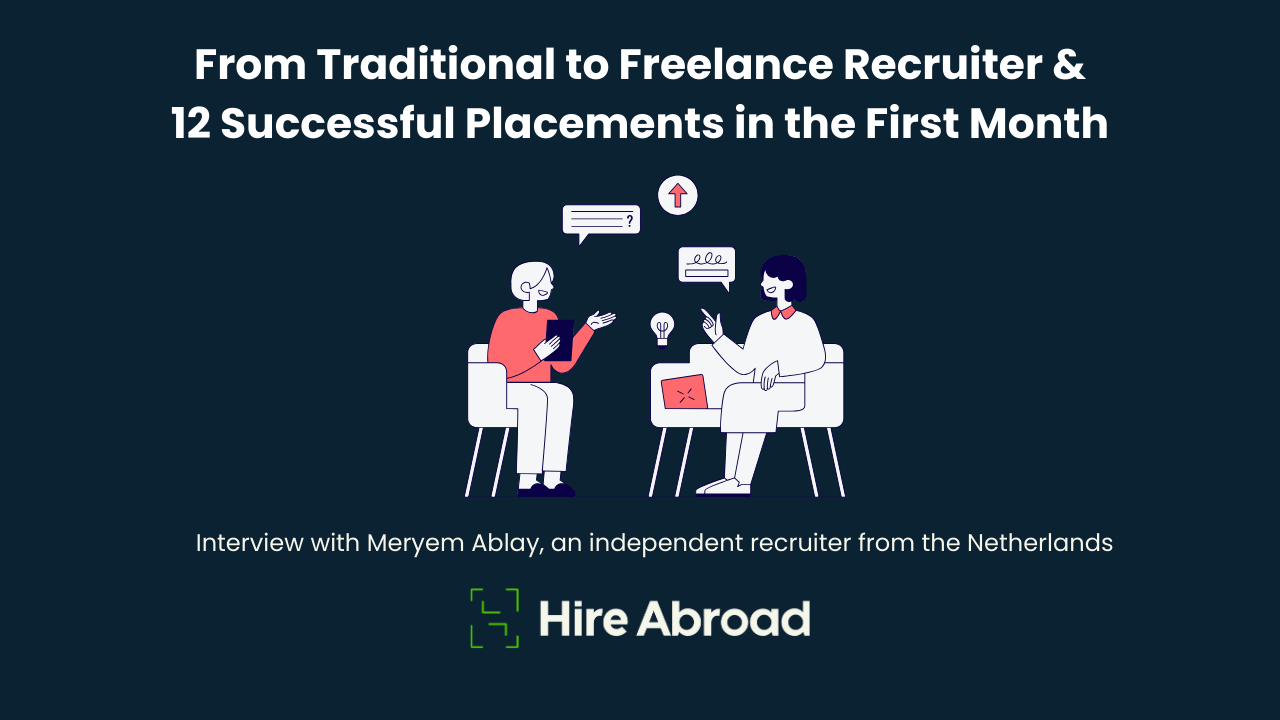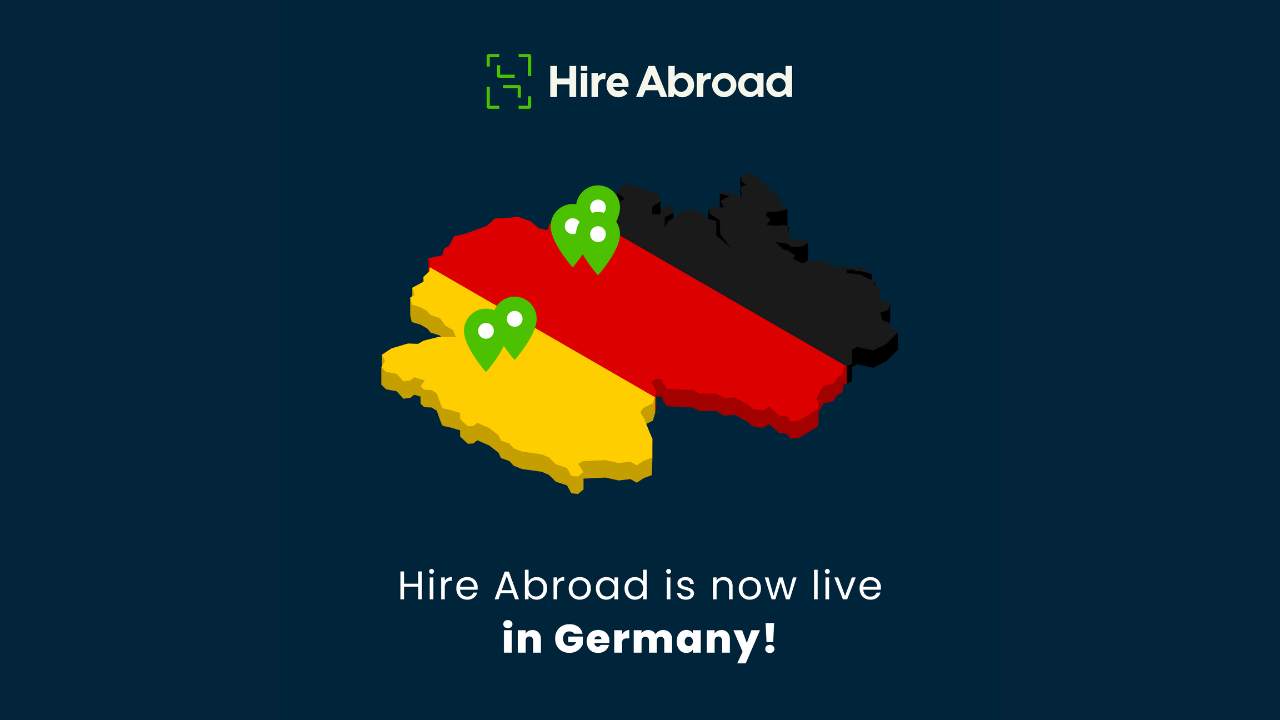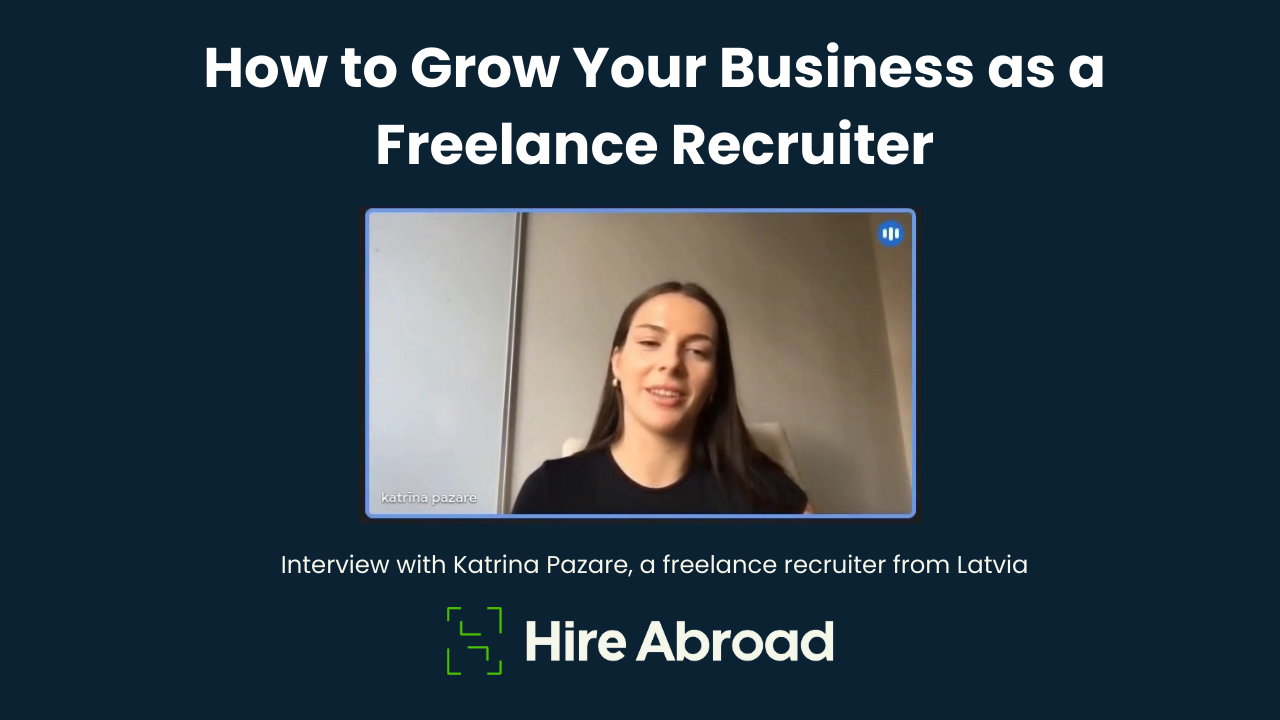Starting a recruitment agency without any experience may sound foolish. In reality, this isn’t a hard thing to do—anyone can start their own recruitment agency even if they had no previous experience as a recruiter.
In this article, we’ll show you how.
What Does a Recruitment Agency Do?
Since you are starting this journey from scratch, it is important to know what a recruitment agency is, what it does, and how its business model usually looks.
A recruitment agency is a company that specialises in finding suitable candidates for specific jobs. Recruitment agencies are often connected to large employers, corporations, and other businesses that outsource their recruitment processes; or employment agencies, which often cover job advertisements, contracts, accommodations, and salaries for the companies.
For example, if you want to establish a recruitment agency in any country in the EU and you want to connect with the companies in the Netherlands because of the market shortage in different sectors, you’d most commonly hire for the employment agencies instead of the employers directly.
It is common for recruiters to specialise in a particular industry. Some companies and individuals focus on the IT industry as there is a great demand for IT experts across the EU and the US, while the others are looking for workers for factories, drivers, agricultural experts, etc.
What’s the Legal Status of a Recruitment Agency?
A recruitment agency can take many legal forms, depending on the country and the jurisdiction it falls under. The most common legal form for a recruitment agency is an LLC, which gives its owners limited liability protection and gives them more control over how the business is run and how it is taxed.
Some of the other forms include partnerships, sole proprietorships, and, since COVID lockdowns and the emergence of the remote working culture, a large number of freelance recruiters.
Therefore, you have nothing to worry about when you are starting your recruitment business—at least not on the legal side of things. All EU countries make it easy for people to establish a recruitment agency. It is up to you to check the laws and procedures in your country.
Now that you know this, let’s see what it actually takes to start your own recruitment business.
Who Do You Want to Recruit?

Since you are just starting out, the first thing you need to do is select an industry to focus on. People coming out of companies have already gained experience in recruiting in a certain industry and they usually establish a firm in the industry they worked in.
As for you, there’s nothing stopping you from entering any industry you think you’d perform well in. However, there are some things you need to consider first:
- Price – Naturally, you want to enter the industry that pays well. For example, employers are willing to pay substantial amounts of money to recruitment agencies for programmers. And this may be your first instinct – to get into IT and recruit people there. However, other industries pay just as well and there might be easier to start in, considering your no-experience resume.
- Demand – The higher the price, the harder it is to find an employee. For instance, finding an IT expert with 15 years of experience could take several weeks, even months. Even when you find and contact people who are qualified for the job, they may come out with some crazy and unrealistic terms and you’re back to square one. On the other hand, finding factory workers is a lot easier. Although the payoff is smaller, large companies and employment agencies are often looking for multiple people to fill in different positions. Let’s say your recruitment agency is established in Poland and you recruit for the Dutch market. There’s already high interest among Polish people for jobs in the Netherlands and the conditions suit them in a majority of cases. The time you’d spend on that one IT senior developer, you can use to hire multiple run-of-the-mill workers and get things going. The demand for both types of workers is high (since they hire recruiters to do their job) but your priority should be to get the ball rolling at first.
- Competition – There is a high number of recruiters no matter the industry, so this is another factor to take into consideration.
Register Your Agency
Now that you have an idea of what you want to do and have made some initial plans, it is time to take action. And the first step here is to register your agency.
Now, each country in Europe has its own laws and regulations regarding opening and registering an agency. No matter where you are from, it is important to look into those laws and make sure that you follow the rules.
We’ve already touched on the legal forms of an agency. But since there are a lot of countries, we will not get into depth.
What we will mention is what the registration does for your recruitment business. First of all, you add credibility and authority to your name and your brand.
Keep in mind that employers and employment agencies often do background checks before they sign any contracts. Your agency needs to be on the register, no matter what legal form it takes. Otherwise, you are running the risk of paying fines or simply not landing any clients, dooming your business from the very beginning.
Website, Email, Logo

Once you are registered, you need to do some other things before you start pitching your clients. And these include:
- Building your website
- Opening a company email
- Creating a logo
Building Your Website
The first thing you need to do is build your own website. Since you are just starting out, we will offer some inexpensive options for you to choose from. While you can spend thousands of dollars for a website, your first priority should be to have a basic static site with your services, pricing, and other essentials for your clients and candidates to see.
The website will give you some extra credibility as well. You don’t need to worry as much about advanced SEO strategies and ranking—just create a visually appealing website with some basic functionality, and that’s it.
And this is something everyone can do, even if they have no experience building websites.
Hosting/Domain
Let’s start with hosting and domains.
Did you know that you can build a website for free?
This is possible to do on Wix. Although Wix offers some paid features that you can add to your website, most of what you need is free, and we will try to keep it that way.
Register on Wix and proceed with creating your website. There’s no credit card required, but you can always upgrade if you want. You’ll answer some questions for Wix to figure out what you need. It is pretty straightforward—you can add different pages, and it looks good from the get-go.
On Wix, you can make your own website in just a few minutes that you can show to job agencies, potential clients, and other candidates.
The other option is slightly more complicated, which is to set up the website with WordPress.
You can buy hosting from providers such as Bluehost and pay for the domain. Bluehost has some inexpensive plans that range from $5.95 to $13.95 per month for 36 months! For just three dollars a month, you can have a secure space where you will host your website. Once you have a host, you will also need a domain name, which ranges from $2 to $20.
There are some other websites that offer a WordPress site with a free domain for $5 a month. After that, all you have to do is set everything up in WordPress, but the website builder features a large number of free themes and blocks that allow you to quickly construct the pages.
You do not need to have any previous knowledge of website building or coding to create a site, and everything is quite logical. You will need several days to finish everything if you have never done it before, but you will have a good-looking website.
There might be some other expenses, such as additional features or plugins that you want to add to keep your site secure.
Either way, you can have your website up and running for no more than $200 a year.
Opening a Company Email
The next thing you will need is a company email. You are starting to build a brand, and it is important that you have all the components necessary for your clients and your candidates to perceive you seriously.
Perhaps the easiest way to open a company email is through Google Workspace. All you have to do is create a Google Workspace account, add your domain, create an email, and proceed to payment. The monthly cost of the company email is $6, and you get:
- 30GB of storage space
- Custom email address
- Third-party app integrations
- Google Meet Video Conferencing (up to 100 participants, 24 h in duration and the ability to record your device)
When you are ready to get started, head over to Google Workspace and create an account.
Creating a Logo
Last but not least, you will need to create a logo. Ideally, you know someone who is into design and who can help you with this. If you don’t, you’ve nothing to worry about.
The easiest way to start off with a logo is to go to Fiverr or Upwork, create your profile, and find logo designers there. You can get a basic logo for $5, but if you want something more complex, you’ll need to raise the price.
Still, a simple $5 logo works, especially at the beginning. But consider paying slightly more for a professional logo because this is a one-time expense.
Imposter Syndrome
One of the biggest obstacles to starting a recruitment agency is the “imposter syndrome.” As a recruiter, you will have to be active on social media, including LinkedIn, and you may want to post some information about yourself on your website as well. Furthermore, your job description includes contacting and talking to a lot of people.
This is where imposter syndrome kicks in. You start doubting yourself and believing that you are not going to make it. Once word spreads among your friends and peers that you’ve opened a recruitment agency, you might face the most resistance to proceeding.
You’ll often get advice from unqualified people that it will likely fail and that you have no experience in recruitment—it is too much of a responsibility to hire people.
Of course, there’s a chance that it will not work out, but you never know until you try it. The initial investments are minimal, and you have nothing to lose. Keep this in mind because it is essential to overcome these obstacles at the beginning of your journey and give your business a real chance.
Getting Clients

Now that you are ready to start, it is time to get your first client. This is probably the most important part because up to this point, you’ve had an agency on paper, but now it is time to become profitable.
Decide on the Business Model
There are different business models that you can consider. How will you charge your clients is one of the first questions you need to ask yourself. Will it be a one-off payment or a fee per worked hour? What happens to the candidates after they’ve completed the paid working hours? Are you going to leave them up to the employers free of charge, or will they have a chance to take them over for a fee?
These are all the things that employers will be interested in. Therefore, before you start sending out proposals, make sure that you establish your business models; otherwise, you will not look professional.
We’ve discussed the demand, the earnings, and the possibilities different industries have. Our advice is to start looking for clients that need warehouse workers, drivers, factory workers, and receptionists—jobs that are easy to fill out and candidates that aren’t that difficult to find.
Such employers, especially those in the Netherlands, often look for new recruits through an agency, and they have experience working with people like you. They will be easier to contact, and it is highly likely that they can use your help to fill out the positions they have.
How you pitch the companies is up to you, but some of the options include:
- Sending out cold emails
- Cold calling
- Contacting businesses through LinkedIn
- Connecting with agencies through Hire Abroad
In all of these cases (except if you join Hire Abroad), you have to think about what you are sending out and always be clear about your message.
Offer the agencies your services, show them your business models and your website, and invite them on a call with you. This is a numbers game, and it is just a matter of time before you sign your first client.
You will be searching for clients a lot at the very beginning of your recruitment journey, but if you do your job well and find qualified candidates that employers hire, they will be eager to recommend you to other businesses as well.
If this search feels too much and you don’t know where to start, we recommend joining Hire Abroad. We already have thousands of open vacancies, and your services are much needed. You can start earning from the moment you register your agency, without the need to search for any clients!
As much as employers and employment agencies do a background check on your recruitment business, you also need to check the employment agencies. For instance, if you find clients in the Netherlands, see if they belong to branch organisations such as ABU or NBBU.
These organisations gather all the employment agencies and make sure that they follow all the rules and adhere to the collective labour agreement, but they also provide protection and ensure they have a say in constructing laws and agreements regarding employment and recruitment in this country.
Sign a Contract
Only when you sign a contract can you start recruiting. Don’t do anything before this point. Although you are eager to start, it is important to be on the same page with your client and know exactly what is expected of you before you proceed.
Also, with the contract signed, you’ll know everything about payments and strategies for your recruitment. Some employers only want you to forward them to potential clients, while others make it necessary for you to interview them as well. These are all the details that you will agree on with your clients.
Once you land a client, congratulations are in order! Before you start looking for suitable candidates, take some time to mark this milestone.
Search for People

Searching for candidates is where the fun begins. You’ve got your contract down, you have the positions that need to be filled, and now it is time to find the right person for the job. The easiest way to do so is to create a job ad and post it on popular websites.
This can cost some money, but you’ll attract a lot of candidates in just a few weeks. Furthermore, you can publish the ad on Linkedin as well to expand your search.
Once you close the applications, you’ll need to sort through the CVs and see which candidates you will invite for an interview.
The interviews don’t need to be long, but at the very beginning, try to schedule as many as you can. It is important to practise your interviewing skills and see what you can expect from candidates.
After the interview, you can forward the candidates to your client, but the exact process is something you prepare beforehand. At this point, you may play the role of the secretary and set up meetings between your candidates and the employers.
Your candidate either gets picked or not. If they don’t select your candidate, you can see what was missing and get a better insight into what they are looking for. After that, you go back to the drawing board, modify your ad if necessary, and simply repeat the process.
If they do select someone, congratulations! You’ve fully closed the loop. But this isn’t where it all stops. There are many more vacancies and employers who need your assistance.
As you gain experience and grow your network, it will be much easier to find suitable candidates. You’ll also be looking for multiple people for different businesses, but you will also know which candidates to choose and which to skip.
Hire Abroad Is the Perfect Place for New Recruiters

There are a lot of things new recruitment agencies need to do to sign deals with clients and find candidates that will be perfect for them. It isn’t easy, especially if you are aiming at international recruitment and companies outside your country.
Hire Abroad has made it easy for both new and experienced agencies from all over Europe by providing a large number of vacancies at all times from countries such as the Netherlands, but also Belgium and Germany.
Thanks to our industry experience, we built a user-friendly platform and allowed you to focus on candidate search while building your brand and getting your name out there!
We can help your new recruitment agency get off to a quick start or help you get out of the rut. Recruitment companies can join Hire Abroad free of charge!
Do you have a recruitment agency and don’t know who to turn to for help? Have any questions for us?
Let’s talk!




